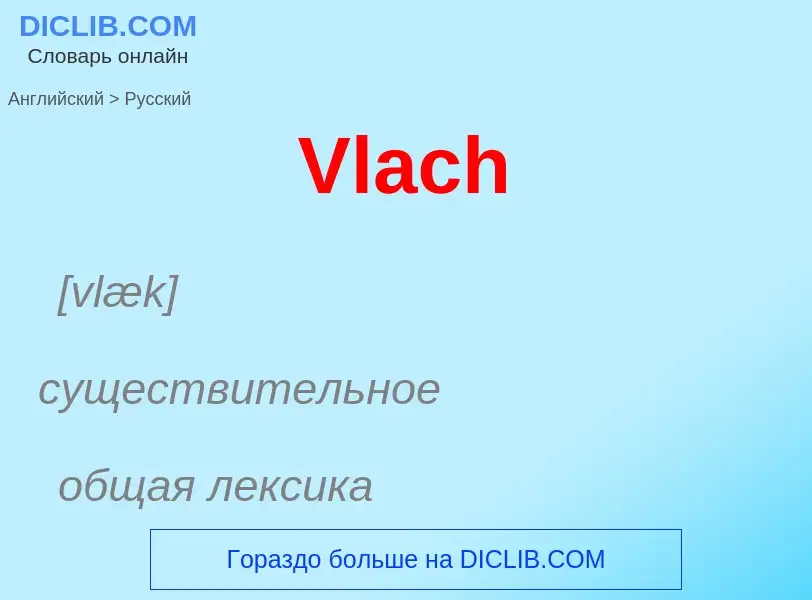Перевод и анализ слов искусственным интеллектом ChatGPT
На этой странице Вы можете получить подробный анализ слова или словосочетания, произведенный с помощью лучшей на сегодняшний день технологии искусственного интеллекта:
- как употребляется слово
- частота употребления
- используется оно чаще в устной или письменной речи
- варианты перевода слова
- примеры употребления (несколько фраз с переводом)
- этимология
Vlach - перевод на русский
[vlæk]
существительное
общая лексика
валах
валашка
['wɔlək]
общая лексика
валлаховский
синоним
['vlækiən]
прилагательное
общая лексика
валашский
валахский
Определение
Википедия

Vlach (English: or ), also Wallachian (and many other variants), is a historical term and exonym used from the Middle Ages until the Modern Era to designate mainly Romanians but also Aromanians, Megleno-Romanians, Istro-Romanians and other Eastern Romance-speaking subgroups of Central and Eastern Europe.
As a contemporary term, in the English language, the Vlachs are the Balkan Romance-speaking peoples who live south of the Danube in what are now southern Albania, Bulgaria, northern Greece, North Macedonia, and eastern Serbia as native ethnic groups, such as the Aromanians, Megleno-Romanians and, in Serbian, the Timok Romanians. The term also became a synonym in the Balkans for the social category of shepherds, and was also used for non-Romance-speaking peoples, in recent times in the western Balkans derogatively. The term is also used to refer to the ethnographic group of Moravian Vlachs who speak a Slavic language but originate from Romanians.
Vlachs were initially identified and described during the 11th century by George Kedrenos. According to one origin theory, modern Romanians, Moldovans and Aromanians originated from Dacians. According to some linguists and scholars, the Eastern Romance languages prove the survival of the Thraco-Romans in the lower Danube basin during the Migration Period and western Balkan populations known as Vlachs also have had Romanized Illyrian origins. However, some non-Romanian historians believe that the Vlachs originated in the southern Balkans and migrated north from there from the 11th-12th centuries onwards.
Nowadays, Eastern Romance-speaking communities are estimated at 26–30 million people worldwide (including the Romanian diaspora and Moldovan diaspora).



![Transylvanian Saxon]] humanist [[Johannes Honterus]]. Transylvanian Saxon]] humanist [[Johannes Honterus]].](https://commons.wikimedia.org/wiki/Special:FilePath/Johann Honterus Septemcastrensis de Corona.jpg?width=200)
![The [[Jireček Line]] between Latin- and Greek-language Roman inscriptions The [[Jireček Line]] between Latin- and Greek-language Roman inscriptions](https://commons.wikimedia.org/wiki/Special:FilePath/Language influence border between Latin and Hellenic.png?width=200)

![Balkan Romance-speaking]] peoples Balkan Romance-speaking]] peoples](https://commons.wikimedia.org/wiki/Special:FilePath/RomaniansInBalkans.png?width=200)
![Hypothetical map projecting the [[transhumance]] paths of the Vlach shepherds in the past Hypothetical map projecting the [[transhumance]] paths of the Vlach shepherds in the past](https://commons.wikimedia.org/wiki/Special:FilePath/Transhumance ways of the Vlachs.jpeg?width=200)
![Medieval necropolis in [[Radimlja]], [[Bosnia and Herzegovina]]. Medieval necropolis in [[Radimlja]], [[Bosnia and Herzegovina]].](https://commons.wikimedia.org/wiki/Special:FilePath/Bosniangraves bosniska gravar februari 2007 stecak stecci3.jpg?width=200)

![Romanian immigrants on [[Ellis Island]] in national dress Romanian immigrants on [[Ellis Island]] in national dress](https://commons.wikimedia.org/wiki/Special:FilePath/Rumanians in America.jpg?width=200)
![Vlach shepherd of [[Banat]] ([[Auguste Raffet]], c. 1837) Vlach shepherd of [[Banat]] ([[Auguste Raffet]], c. 1837)](https://commons.wikimedia.org/wiki/Special:FilePath/Raffet - Berger du Banat.jpg?width=200)
